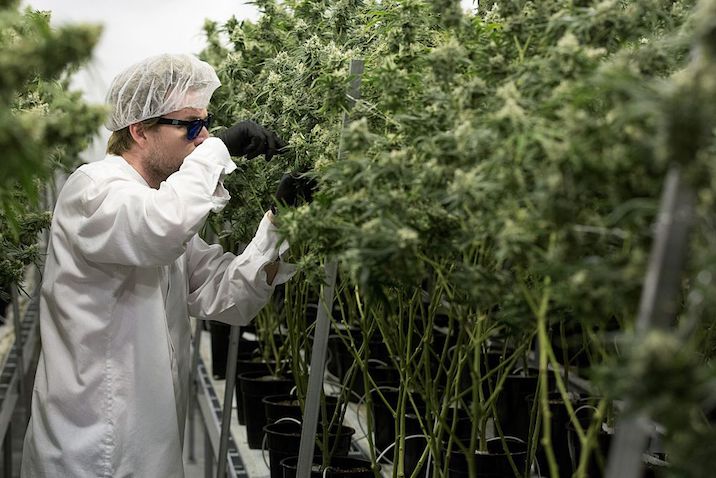You are here
Home 🌿 Marijuana Politics 🌿 The Guardian looked at Canada's cannabis industry. Its verdict was firm but fair 🌿The Guardian looked at Canada's cannabis industry. Its verdict was firm but fair

What went wrong?
That’s the question at the heart of a recent story in The Guardian about Canada’s ailing cannabis sector, written by London-based reporter Michael Power. In 2018, the United Kingdom legalized medical cannabis and Power predicts that the UK will follow Canada’s lead and legalize adult-use cannabis within the next five years.
Like many other nations that are considering evolving their cannabis laws, the UK is looking to Canada to learn what’s worked and where the sector has floundered.
Power points to Canada’s much-maligned retail patchwork as one issue that has plagued the sector’s growth, highlighting Ontario’s lack of stores in particular. The province has worked to remedy that in 2020, with new stores opening on an almost weekly basis, but the spread of COVID-19 has temporarily halted those expansion efforts.
For now, there are fewer than 100 cannabis stores in the nation’s most populous province. Until that changes, other issues the industry is facing — like the mountain of oversupply which Power notes is weighing in at 400 tonnes — will continue to grow.
Power also discusses the quality of Canada’s legal products, which have been criticized for being overly expensive, less varied and less potent than what is readily available on the illicit market. One of the stated goals of legalization was to move consumers out of the legacy market and into a legal framework, but those efforts have faltered as access to legal cannabis remains an issue in most of the country.
Licenced producers have taken steps in recent months to address this, with many offering discounted products, like Hexo’s Original Stash. An ounce of Original Stash retails for about $125 in Quebec and $140 in Ontario, prices that are competitive with the illicit market. According to StatsCan, New Brunswick faces the highest price disparity between the legal and legacy markets. On average, a gram of legal weed in New Brunswick costs $11.36 a gram, while illegal cannabis goes for $4.90 a gram.
Legal prices in Canada are inflated by a number of factors, including provincial wholesalers, who take a cut from every sale, and the excise and sales taxes, which push price points further north. And then there’s the costs of regulatory oversight.
Regulation, characterized by many who work in the industry as “extreme,” coupled with high barriers to entry, has further slowed Canada’s market development. The illicit trade does not need to be concerned about any of these factors.
Power also points to a lack of cash flow in the industry, overlooked medical cannabis consumers, and stock promoters and short-sellers fuelling market fluctuations as things that have gone wrong.
He does note, however, that despite all of the negatives, Canada’s approach to legalization has not been a failure. “If we compare it to the UK cannabis industry, where illegally trafficked children have been found enslaved in abandoned buildings growing cannabis for gangsters, it is better by several orders of magnitude,” Power writes.
For all the faults of the sector and the government’s approach to legalization, the fact that Canadians can now legally grow cannabis in their own homes cannot be overstated. This is a monumental shift after a century of prohibition. The Canadian cannabis industry is still nascent, and while COVID-19 has further dampened even the bleakest economic outlooks, it’s a sector that will continue to mature and grow in the years ahead. Canada can be proud of its precedent-setting position.
“What Canada’s experience demonstrates is that cannabis legalization does not instantly deliver some great social panacea,” Power writes. “There is no promised land. But we should never lose sight of this essential truth: Canadians can no longer be jailed for growing and eating and smoking certain flowers. That is a huge, fundamental step forward, no matter what the stock market indices say.”
420 Intel is Your Source for Marijuana News
420 Intel Canada is your leading news source for the Canadian cannabis industry. Get the latest updates on Canadian cannabis stocks and developments on how Canada continues to be a major player in the worldwide recreational and medical cannabis industry.
420 Intel Canada is the Canadian Industry news outlet that will keep you updated on how these Canadian developments in recreational and medical marijuana will impact the country and the world. Our commitment is to bring you the most important cannabis news stories from across Canada every day of the week.
Marijuana industry news is a constant endeavor with new developments each day. For marijuana news across the True North, 420 Intel Canada promises to bring you quality, Canadian, cannabis industry news.
You can get 420 Intel news delivered directly to your inbox by signing up for our daily marijuana news, ensuring you’re always kept up to date on the ever-changing cannabis industry. To stay even better informed about marijuana legalization news follow us on Twitter, Facebook and LinkedIn.




